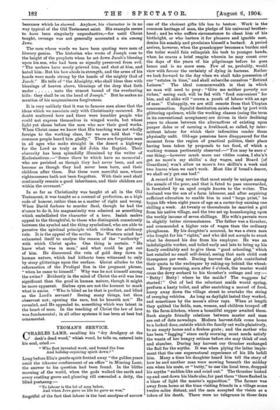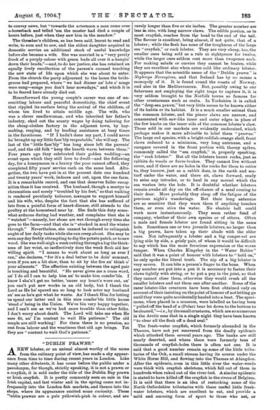" Who first invented work, and bound the free And
holiday-rejoicing spirit down ? "
Long before Elia's gentle spirit fretted away " the golden years amid the irksome confinement of an office" in Mincing Lane, the answer to his question had been found. In the blithe morning of the world, when the gods walked the earth and every rustling grove and glancing rill concealed a deity, the blind poetisang
:- "To labour is the lot of man below, And when Jove gave us life he gave us woe," forgetful of the fact that labour is the best anodyne of sorrow
hood ; and he who suffers circumstance to cheat him of his birthright, or who barters it for pleasure and ignoble ease, denies his sonship and proclaims himself a bastard. A period arrives, however, when the grasshopper becomes a burden and the toiler would fain relinquish his task to younger hands, when he craves a brief respite wherein he may count over the days of the years of his pilgrimage before he goes hence and is no more seen. Few of us, probably, would view with favour the certainty of dying in harness. Rather we look forward to the day when we shall take possession of our "estates in time," and shall subscribe ourselves "Retired Leisure." The ideal commonwealth is that in which no man will need to pray : " Give me neither poverty nor riches," seeing each will be fed with "food convenient" for him, and all alike will " crown a youth of labour with an ago of ease." Unhappily, we are still remote from that Utopian consummation. Squalid destitution exists cheek by jowl with glittering opulence, while the working classes (using the term in its.conventional acceptance) are driven in their declining years to choose between the alternatives of existing upon pauper doles or of earning a livelihood, so called, by inter- mittent labour for which their infirmities render them physically unfit. Old-age pensions have disappeared for the moment from the region of practical politics, their place having been taken by proposals to tax food, of which a working woman pertinently observed You may be sure o' one thing,—however much more our vittles costes, I sha'n't get no more'n my shillin' a day wages, and Board [of Guardians] won't allow us more'n two shillin's a week and two loaves when we can't work. Most like if bread's dearer, we shall on'y get one loaf."
A record of long service that must surely be unique among the annals of the poor, and that is fated to pass unrewarded, is furnished by an aged couple known to the writer. The husband was the son of a farm labourer, and after acquiring sufficient education to enable him to read " large print," he began life when eight years of age as a carter-boy earning one shilling a week. At twenty or thereabouts he married a girl from his native village, and the two set up housekeeping upon the weekly income of seven shillings. His wife's parents were in slightly better circumstances. The father was a thrasher, and commanded a higher rate of wages than the ordinary ploughman. By his daughter's account, he was a stern man who fought for his " rights," and who did not scruple to exact what he deemed his due from his employer. He was an indefatigable worker, and toiled early and late to bring up his family creditably and to give them "good schooling," which last entailed no small self-denial, seeing that each child cost threepence per week. During harvest the girls contributed their quota to the exchequer by raking-up behind the wheat- cart. Every morning, soon after 5 o'clock, the master would cross the dewy orchard to his thrasher's cottage and cry:- " Betty ! Betty ! where be the maids ? The waggons ha' started!" Out of bed the reluctant maids would spring, perform a hasty toilet, and after snatching a morsel of food, hurry away down the village street to overtake the string of creeping vehicles. As long as daylight lasted they worked, and sometimes by the moon's silver rays. When at length they quitted the fields, men, women, and children trooped off to the farm-kitchen, where a bountiful supper awaited them. Such simple friendly relations between master and man are out of date nowadays. Modern harvest-folk come home to a locked door, outside which the family cat wails plaintively, to an empty house and a fireless grate ; and the mother who has been " fagging" since early morning must needs satisfy the wants of her hungry retinue before she may think of rest and slumber. During hay harvest our thrasher exchanged the flail for the scythe. It was when plying the latter imple- ment that the one supernatural experience of his life befell him. Many a time his daughter beard him tell the story of how he and another man were mowing beneath the midday sun when his mate, or " butty," to use the local term, dropped his scythe "sudden-like and cried out." The thrasher looked up and cast down his blade also, for past them " there flashed in a blaze of light the master's apparition." The farmer was away from home at the time visiting friends in a village some twelve miles distant, and the men accepted the vision as a token of his death. There were no telegrams in those days
to convey news, but "towards the arternoon a man come over a-horseback and telled 'um the master had died a couple of hours before, just when they saw him in the meadow."
The thrasher's children, as has been said, learnt to read and write, to sum and to sew, and the eldest daughter acquired in domestic service an additional stock of useful knowledge before she became a wife. She was married in a " very pretty frock of a purply colour with green buds all over it a-hangin' down their heads,"—and, to do her justice, she has retained an equally lively recollection of the parson's counsel touching the new state of life upon which she was about to enter. From the church the party adjourned to the home the bride- groom had prepared, where " we had dinner an' lots o' songs were sung—songs you don't hear nowadays," and which it is to be feared have already died out.
Henceforward the young couple's career was one of un- remitting labour and peaceful domesticity, the chief event that rippled its surface being the arrival of the children, of whom ten lived to attain middle age. The wife, who was a clever needlewoman, and who inherited her father's industry, eked out the scanty wages by doing tailoring for the cheap-clothes factory in the adjacent town, by hay- making, reaping, and by lending assistance at busy times in the farmhouse. " If I hadn't done my part, I could never ha' brought up my little fam'bly respectable," she will say. The last of the "little fam'bly" has long since left the parents' roof, and the old folk "keep the hearth warm between them." Four years ago they celebrated their golden wedding--an event upon which they still love to dwell—and the following day, for a honeymoon is a luxury the poor cannot afford, they completed fifty years' service each on the same land. Alto- gether, the two have put in at the present date one hundred and twenty years' work, indoors and out, upon the one farm. It is a remarkable record, and one that deserves fuller recog- nition than it has received. The husband, though a martyr to rheumatism and sorely " troubled by his feet," so that walking is rendered peculiarly toilsome, manages to support himself and his wife, who, despite the fact that she has suffered of late from a painful form of heart-disease, still attends to the poultry at the homestead near by. She finds this duty some- what arduous during bad weather, and complains that she is " watchet"—namely, her shoes are wet through every time she goes to the farm—and that she is " stocked in mud the winter through." Nevertheless, she cannot be induced to relinquish aught of her daily tasks while she can creep about. She may be seen any day feebly attempting to dig the potato patch, or to saw wood. She was well-nigh a week cutting through a log the thick- ness of her wrist, so ineffectively does the weak flesh aid her willing spirit. " I means to work about as long as ever I can," she declares, "for it's a deal better to be doin' summat, even if you are a bit slow, than to sit by the fire an' think o' your ailments." The affection existing between the aged pair is touching and beautiful. " He never gives me a cross word, an' I do all I can to help him an' to make him comfer'ble. I know I cha'n't get no better, 'cause my heart's wore out, an' you can't put new works in an old body, but I thank the Lord as He ha' spared ma so long to look arter my husband an' see as he's got what he wants. An' I thank Him for letting us spend our latter end in this nice comfer'ble little house 'stead o' being in the Union. We've bin very happy together, and I can't see as we've had more trouble than other folks. I don't werry about death. The Lord will take me when He sees fit, an' I'm content to wait His patience." The old couple are still working! For them there is no pension, no rest from labour and the weariness that old age brings. Yet they are " content to wait God's patience."
"DUBLIN PRAWNS."







































 Previous page
Previous page